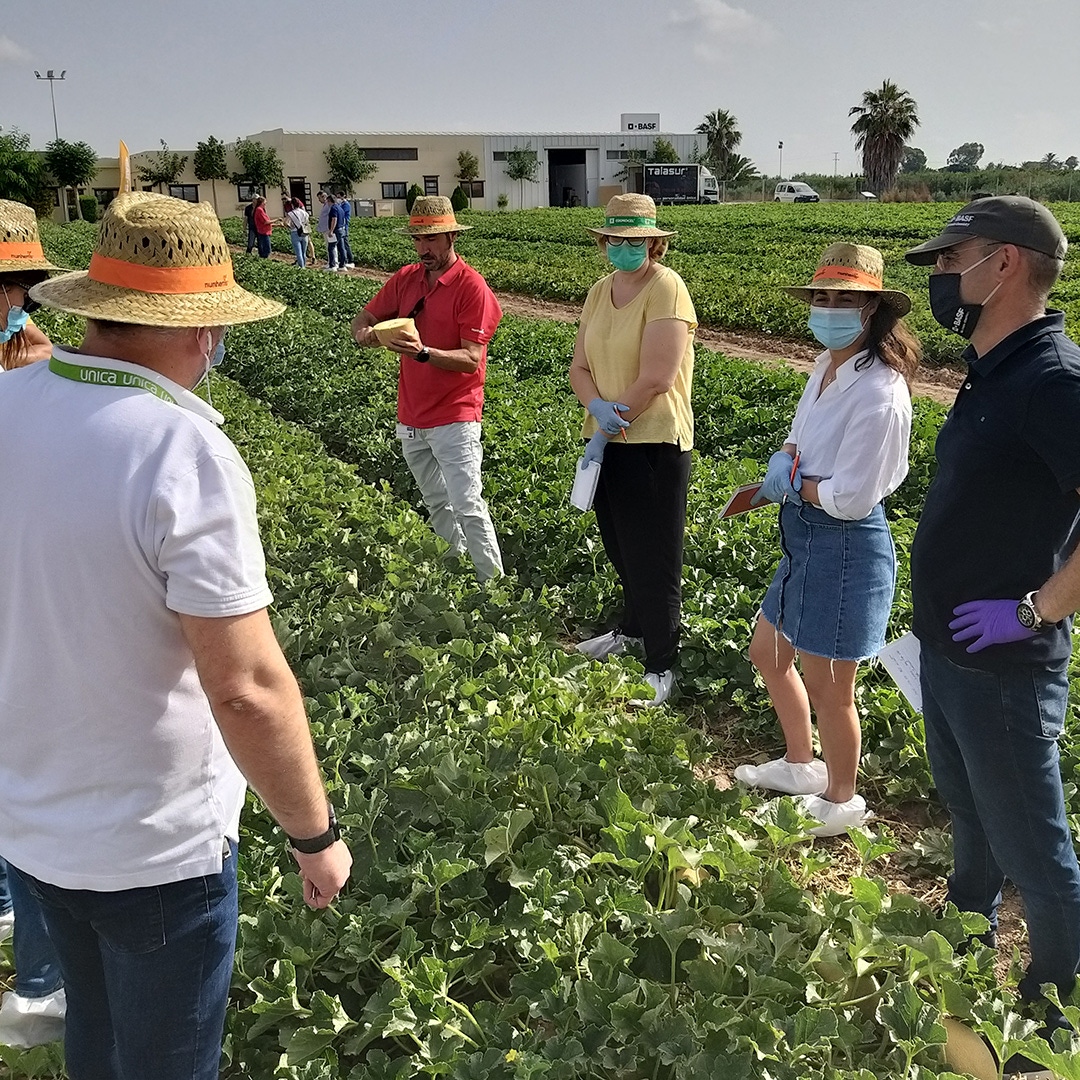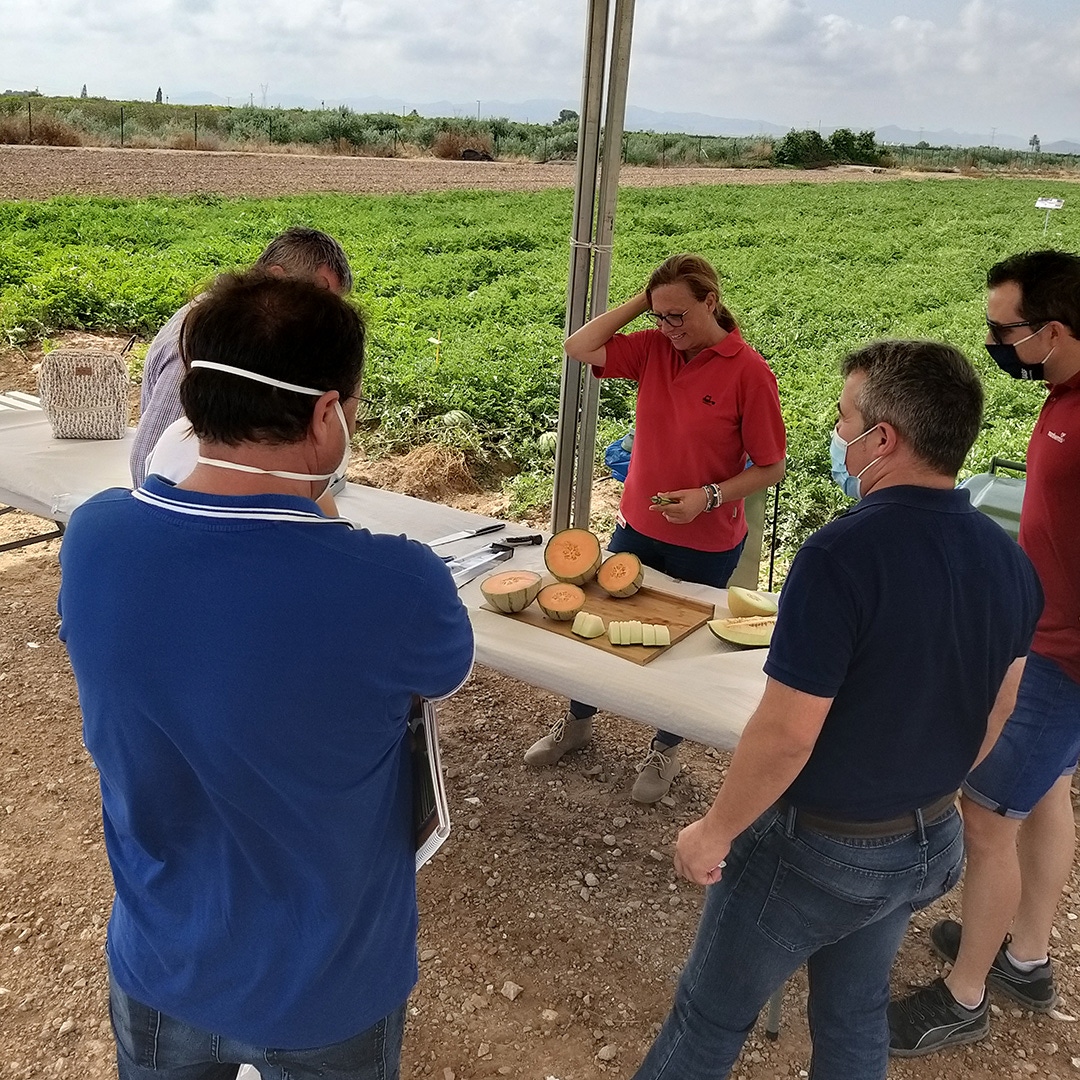Media
BASF continues diversifying its Nunhems melon and watermelon portfolio to satisfy the consumer
BASF showcased its new varieties and concepts geared towards maximizing flavor to the value chain
Flavor, safety and differentiation. These are the strategic objectives that drive the varietal development of melons and watermelons at BASF, which were shown at its Melon & Watermelon Business Trends for Experts event held at the company’s R&D centre in La Palma (Cartagena).
BASF‘s annual melon and watermelon event – obviously held this year in line with strict health and safety measures – brought together professionals from the whole value chain to show them the new varieties and ground-breaking concepts in both crops.
Under the Nunhems® brand, BASF offers a range of Piel de Sapo melons for open field with excellent internal quality, flavor and caliber (3-4 kg). Coliseo (early season) and Envero (late season in Murcia and both early and mid-season in La Mancha) are productive varieties that are also resistant to powdery mildew. In addition, Coliseo has intermediate resistance to the New Delhi virus (ToLCNDV) which has allowed it to become established as a late-season greenhouse crop in Almería.
For La Mancha region, the company is already working on new material for the mid-season cycle with the double aptitude of being sold as either a fresh or processed product thanks to its firm flesh. “It is resistant to powdery mildew and the plant is vigorous enough to be grown in depleted soils such as those in La Mancha,” explained José Ramón Naranjo, the Melon Sales Specialist at BASF Vegetable Seeds.
Kukino is Piel de Sapo melon export brand. Under this brand, currently there are two varieties, Kumara and Kudoru, with which the vegetable seed company covers the production cycle in Spain from June to September. Kukino “offers consumers a smaller caliber melon with all the traditional flavor”, adapted to new family structures and the convenience that consumers demand. Both these properties also make it ideal for the Spanish market.
Safety in melons
Making sure the product reaches the shelves at the optimum point of ripeness is essential to ensure consumer satisfaction, and this is exactly what has been achieved with Galkia® Galia melon and Sun Type cantaloupe. Galkia® is already very well-established in the market, but “we are continuing to implement improvements to facilitate a longer production period”, explained Enrique Ballester, the Melon Account Manager at BASF Vegetable Seeds.
Kisane and Kiyoba are the novelties which, along with Kirene and Kinium, round off the season in Spain. Both of them are also resistant to powdery mildew and aphids and offer greater plant vigour which leads to “more uniform calibres”.
Galkia® and Sun Type offer assurance to growers, retailers and consumers. The varieties under this brand, range from green to a creamy yellow when it reaches its optimum Brix rating, “unambiguously marking the cut point”.
Finally, with its Crispy line, the company has again demonstrated its commitment to differentiation as a formula to win consumers. This is a yellow melon, at least in external appearance, whose small calibre (around 1.2 kg) meets modern-day consumers’ demand for convenience. In addition, continuing the approach of offering versatility to retailers, it is suitable for both fresh and processed use. “In the melon, we strive to differentiate ourselves, always with the goal of customer satisfaction,” said Ballester, who explained that to achieve this end it is essential to guarantee both quality and flavor. Yet this is not enough: growers also need to make a profit, which is why BASF pays so much attention to agronomic aspects such as productivity and resistance.
Advances in watermelons
The watermelon portfolio offers varieties for four segments: fresh, with double purpose (fresh and processed); mini/midi formats, processed fruit, and the fresh-cut market. In this particular case, rather than restricting itself to simply developing the different varieties, BASF’ is working hand-in-hand with its clients on a number of projects in order to offer a global response to market demands.
In the case of fresh market, Sun Gem and Moon Gem continue to set the standard – two varieties that stand out for their deep colour and excellent flavor, with a Brix rating of up to 14º. “They offer an explosion of flavor in the mouth,” confirmed Pere Montón, Watermelon Account Manager at BASF Vegetable Seeds.
Meanwhile, Bazman and Harmonium varieties can be used for either the fresh or processed markets. The former has a bigger caliber than the latter but both have the firm flesh necessary to guarantee a ‘clean cut’, a deep red colour and stable quality throughout the production cycle.
Hiromi and Kalanda are two varieties for the mini/midi watermelon segment, both are pollinators with micro-seeds whose internal quality even allows them to be grown in monoculture holdings. Moreover, in the case of Hiromi, its smaller caliber of 1.5-2.5 kg makes it the ideal watermelon for the organic market, which requires whole fruit.
BASF firmly believes that flavor should not be exclusive to the varieties for the fresh consumption market, so for the processed sector they have introduced novelties that “maintain their firm flesh yet without relinquishing either flavor or that characteristic deep red colour”, explained Montón. Royal Slice*, for projects in Brazil, and the NUN 31707 WMW* are new offerings.
With all these materials, BASF again underlines its commitment to flavor to achieve market leadership in both the melon and watermelon segments. Without losing sight of this goal, the company also works hard to diversify its range, surprise consumers, and offer varieties that in agronomic terms meet the demands of both producers and retailers.
*APC granted and in the application process for inclusion in the EC Common Catalogue of Vegetable Varieties.
About BASF’s Agricultural Solutions division
With a rapidly growing population, the world is increasingly dependent on our ability to develop and maintain sustainable agriculture and healthy environments. Working with farmers, agricultural professionals, pest management experts and others, it is our role to help make this possible. That’s why we invest in a strong R&D pipeline and broad portfolio, including seeds and traits, chemical and biological crop protection, soil management, plant health, pest control and digital farming. With expert teams in the lab, field, office and in production, we connect innovative thinking and down-to-earth action to create real world ideas that work – for farmers, society and the planet. In 2019, our division generated sales of €7.8 billion. For more information, please visit www.agriculture.basf.com or any of our social media channels.
About BASF
At BASF, we create chemistry for a sustainable future. We combine economic success with environmental protection and social responsibility. More than 117,000 employees in the BASF Group work on contributing to the success of our customers in nearly all sectors and almost every country in the world. Our portfolio is organized into six segments: Chemicals, Materials, Industrial Solutions, Surface Technologies, Nutrition & Care and Agricultural Solutions. BASF generated sales of €59 billion in 2019. BASF shares are traded on the stock exchange in Frankfurt (BAS) and as American Depositary Receipts (BASFY) in the U.S. Further information at www.basf.com.

